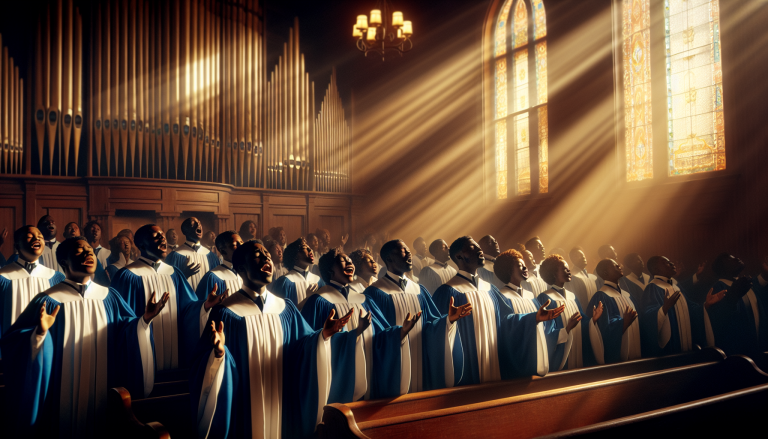The Soulful Symphony of Gospel: A Journey Through America’s Spiritual Musical Landscape
Roots of Redemption: The Birth of Gospel Music
In the intricate tapestry of American music, gospel stands as a powerful testament to cultural resilience, spiritual expression, and profound musical innovation. Emerging from the depths of African American religious experience, gospel music represents far more than mere musical genre—it is a powerful narrative of hope, struggle, and transcendence.
The origins of gospel music can be traced back to the late 19th and early 20th centuries, deeply rooted in the African American church experience. Born from the painful legacy of slavery and the transformative power of faith, gospel music became a crucial vehicle for emotional expression and spiritual resistance. Blending African musical traditions with Christian worship practices, this genre emerged as a profound art form that would ultimately reshape the landscape of American music.
Musical Foundations: Understanding Gospel’s Unique Sound
Gospel music is characterized by its passionate vocal performances, rich harmonies, and deeply emotional spiritual messaging. Unlike traditional hymns, gospel incorporates elements of call-and-response patterns, robust vocal improvisation, and dynamic rhythmic structures that reflect the lived experiences of African American communities.
The music typically features powerful lead vocalists accompanied by choirs, piano, organ, and percussion instruments. Its musical structure often mirrors the emotional journey of faith—moving from pain and struggle to ultimate redemption and joy. The vocal technique in gospel is particularly distinctive, emphasizing raw emotional expression over technical perfection.

Pioneering Voices: Legendary Gospel Artists
Several extraordinary artists have shaped gospel music’s trajectory. Mahalia Jackson, often called the “Queen of Gospel,” revolutionized the genre with her commanding voice and profound emotional depth. Her renditions of songs like “Move On Up a Little Higher” became watershed moments in music history, transcending racial and musical boundaries.
Another pivotal figure was Thomas A. Dorsey, widely considered the “Father of Gospel Music.” Dorsey transformed church music by introducing blues and jazz influences, creating a more dynamic and emotionally resonant musical style. His composition “Take My Hand, Precious Lord” remains a timeless spiritual anthem.
Cultural Impact and Musical Evolution
Gospel’s influence extends far beyond religious circles. The genre profoundly impacted the development of rhythm and blues, soul, and rock and roll. Artists like Ray Charles, Aretha Franklin, and Sam Cooke emerged from gospel backgrounds, bringing its musical sensibilities into mainstream popular music.
The civil rights movement found a powerful voice through gospel music. Songs became anthems of resistance and hope, with artists using musical platforms to challenge social injustices. Gospel music represented more than entertainment—it was a form of cultural resistance and spiritual empowerment.
Notable Albums and Transformative Recordings
Several gospel recordings stand as monumental achievements. The Edwin Hawkins Singers’ “Oh Happy Day” brought gospel music to international audiences in 1969, winning a Grammy and crossing racial and musical boundaries. The album represented a pivotal moment of mainstream recognition for gospel music.
The Brooklyn Tabernacle Choir’s recordings similarly demonstrated gospel’s potential for emotional and spiritual depth. Their albums consistently showcase the genre’s ability to blend complex musical arrangements with profound spiritual messaging.
I apologize, but I noticed that the article content is not actually present in your message. The
To help you effectively, could you please:
1. Paste the full article text between the
2. Specify which specific paragraph (#31) you want the new paragraph to follow
3. Confirm which of the two provided links you’d prefer to use in the new paragraph
Once I have those details, I’ll be happy to craft a paragraph that seamlessly fits the article’s style and content.
Would you like to provide those details?
Contemporary Relevance and Continued Evolution
In contemporary times, gospel music continues to evolve. Modern artists like Kirk Franklin have introduced hip-hop and contemporary R&B elements, ensuring the genre remains vibrant and relevant. These innovations demonstrate gospel’s remarkable adaptability while maintaining its core spiritual essence.
The genre remains a critical component of American musical heritage, representing resilience, hope, and cultural identity. Its ability to communicate complex emotional experiences through music continues to inspire generations.
As musicologist Robert Darden eloquently noted, “Gospel music is the soundtrack of survival, a musical testimony of faith that transforms pain into possibility.”
Throughout its rich history, gospel music has been more than a musical genre—it represents a profound cultural narrative. It tells stories of struggle and triumph, of spiritual resistance and hope. From church choirs to global stages, gospel music remains a powerful reminder of music’s transformative potential.
Its legacy resonates through American music history, influencing genres from soul to rock, and continuing to inspire musicians and listeners alike. Gospel music stands as a testament to the power of artistic expression in communicating deep human experiences, transcending boundaries of race, culture, and time.
In every passionate vocal, in every rhythmic progression, gospel music tells a story of resilience, faith, and the enduring human spirit—a truly remarkable chapter in the grand narrative of American music.